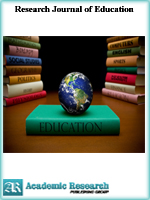Research Journal of Education
Online ISSN: 2413-0540
Print ISSN: 2413-8886
Print ISSN: 2413-8886
Quarterly Published (4 Issues Per Year)

Archives
Volume 5 Number 7 July 2019
Emergence of Youth Criminal Groups Popularly Known as Panya Road and Ubaya Ubaya in Tanzania: The Case of Dar es Salaam City and Zanzibar Town
Authors: Dr. Fauzia Mohamed ; Mussa Ali Mussa
Pages: 119-127
DOI: doi.org/10.32861/rje.57.119.127
Abstract
This paper focused on analysis of emergence of criminal groups in Dar es Salaam city and Zanzibar town. Data collection was based on in-depth interviews and focus group discussions. Content analysis was used in analysis of data collected from the study. The study findings revealed that youths are vulnerable and susceptible to criminal activities due to corruption, fake promises from politicians, education systems, laxity of parental or guardians’ care and inspiration of children to live luxurious life. In addition, the study recommended to take proper moves that police operation and other government authorities undertake on use of force that cannot end such societal challenges. Instead, the government should provide education system, which is skilled oriented to enable young people to employ themselves. In addition, more efforts are needed to fight corruption from low level to high level of government system.
Value and Impact of Adult Education: Voices of Zambian Communities
Authors: Daniel L. Mpolomoka ; Musonda Luchembe ; Selina Banda ; Peter Sampa
Pages: 114-118
DOI: doi.org/10.32861/rje.57.114.118
Abstract
Zambian communities are rich with voices of the value of adult education, albeit unsystematically documented. It is these insightful voices that this article unveils. A phenomenological research design was employed. Three research sites were targeted comprising two chiefdoms and covering four villages, two villages from each chiefdom. Data was collected using interviews and focus group discussions. After coding the data, narrative and thematic methods of data analysis were used. Findings reveal that the value of adult education is measured informally by the number of the adult population able to access social amenities equitably and equally on one hand, and on the other, by their ability to read the ‘word and the world’ as purported by Freire and Macedo (1987).



